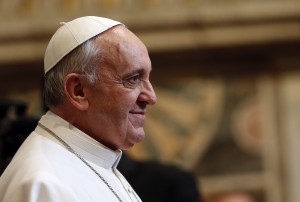
Pope Francis smiles during an audience with ambassadors from the 180 countries that have diplomatic relations with the Holy See, at the Vatican, Friday, March 22, 2013. The election of Pope Francis has prompted soul-searching in his native Argentina, where the 1970s “Dirty War” between a military junta and leftist opposition divided the local church. AP PHOTO/TONY GENTILE
BUENOS AIRES, Argentina—The election of Pope Francis has prompted soul-searching in his native Argentina, where the 1970s “Dirty War” between a military junta and leftist opposition divided the local church.
Defenders of Pope Francis, formerly Cardinal Jorge Bergoglio, insist he was among those Catholic clergy who quietly resisted a brutal regime as scores of priests, nuns and others were arrested, tortured, killed and disappeared.
Critics insist Bergoglio failed to speak out when bishops and top Church officials who disdained the socialism of the opposition turned a blind eye to the abuses or openly sided with the military dictatorship.
“We could have hoped for a more active resistance on the part of the Church and Father Bergoglio, but if that had been the case he would no longer be with us,” French historian Odon Vallet told AFP.
The Ecumenical Movement for Human Rights (MEDH) says around a hundred priests, nuns, seminarians and other clergy were killed or disappeared during the 1976-1983 dictatorship.
Others were arrested, tortured and then released, as occurred with Jesuit priests Francisco Jalics and Orlando Yorio, who were freed after Bergoglio intervened on their behalf, according to a third priest who worked with them.
“Thanks to Bergoglio, I am alive and talking with you today,” Father Jose Caravias told AFP in Paraguay, where he is now based, saying Bergoglio tipped him off to a death threat from a rightwing militia in the 1970s.
Bergoglio also claimed to have intervened to save the two priests.
The 76-year-old has said he helped several other people go into hiding or escape the country during the dictatorship, and protected three seminarians from the diocese of La Rioja, a hotspot during the conflict.
Adolfo Perez Esquivel, an Argentine human rights activist who won the Nobel Peace Prize in 1980, came to Bergoglio’s defense this week.
“He preferred a silent diplomacy, inquiring about the disappeared and the prisoners,” the prominent human rights activist who campaigned against the junta said this week.
“The pope had nothing to do with the dictatorship,” he added, saying the justice system had found “no proof” of any collaboration.
“In the Argentinian Catholic hierarchy there were some bishops complicit with the dictatorship but Bergoglio was not one of them,” he told reporters.
Vallet argues that the military dictatorship was far more brutal in Argentina than similar regimes in other Latin American countries, where the Church was more outspoken.
“When there is more terror, the people are more silent,” he said. “It’s difficult to oppose (such a regime) directly without losing many martyrs.”
Two Catholic priests and a layman murdered during the regime in 1976 are being considered for sainthood under a process launched by Bergoglio when he was the archbishop of Buenos Aires.
But other priests have been implicated in the regime’s crimes, including former Buenos Aires police chaplain Christian Von Wernich, sentenced to life in prison in 2007 for six killings, 31 cases of torture and 42 abductions.
And Jorge Videla, the general who ruled Argentina from 1976 to 1981, when some of the worst violations were carried out, was quoted in a 2012 book as saying the junta had “very good” relations with the Church.
Relatives of victims of the “Dirty War”—which killed an estimated 30,000 people—accuse the clergy of remaining silent and in some cases of denouncing the regime’s opponents.
The famous Grandmothers of the Plaza de Mayo organization, founded in 1977 to help locate children kidnapped during the military era, has accused Bergoglio of failing to do enough—then or now.
The head of the association, Estela Carlotto, said the pope “has never spoken of the problem of people who had disappeared under dictatorial rule.”
The Argentine church has lamented on a number of occasions that it did not do enough to help victims of the dictatorship, while victims and their families have called on the church to open its archives from the dark period.—Alexandre Peyrille